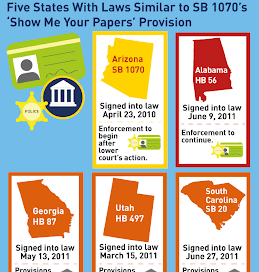Courts across the country are allowing police to ask Americans to “show them their papers.”

Courts are beginning to allow the so-called “show me your papers” clauses of tough new state immigration laws to take effect. But they’re warning states that the US Constitution frowns on any hint of profiling.
The US Supreme Court in June upheld “show me your papers” provisions in Arizona, which allow law-enforcement officials to ask for the immigration documents of people they suspect might be in the country illegally during routine stops. Now, lower courts are beginning to lift injunctions on similar laws in Georgia and Alabama, and a state judge was set to rule on whether to lift an injunction against it in Arizona itself, where Gov. Jan Brewer said that “the heart” of the state’s controversial law should “be allowed to take effect.”
As these laws take hold in the real world, focus is likely to shift to local and state police, who stand to face enormous pressure to use their expanded discretionary powers fairly and judiciously.
“The idea that this is the rubber hitting the road is exactly right,” says Stephen Vladeck, a law professor at American University’s Washington College of Law, in Washington. “Law enforcement already has lots of opportunities to stop most people on a daily basis for entirely minor offenses. The question is, stopping people for spitting on the sidewalk or driving with a broken taillight, are we going to see those increase in jurisdictions … that have the ‘papers, please’ provision? In other words, you cannot use the possibility that someone is undocumented to justify the stop in the first place.”
The issue has powerful emotional resonance in a country that historically valued freedom from government intrusion, raising the question of whether the “immigration laws really catch more people in the net than the Constitution should allow,” says Leon Friedman, a law professor at Hofstra University.
These concerns relate to the Constitution’s Fourth Amendment, which protects Americans from warrantless searches and seizures and restricts police from conducting random ID checks of people walking around on American streets. The immigration laws passed legal muster because a person has to have been detained or accused of a crime before police check their name against the e-Verify system, a federal immigration database.
“You can’t just stop them on the street and say, ‘Show your identification,’ ” Professor Friedman says. “There has to be a legitimate reason for stopping or arresting them, and then you can’t keep them indefinitely. In fact, the states have said, ‘We can keep you for a week,’ but the Supreme Court said they can’t do that.”
The general tenor of the courts is one of skepticism about the new breed of laws. For example, the 11th Circuit Court, which oversees Alabama, Georgia, and Florida, struck down significant parts of the Alabama and Georgia laws, including the creation of new crimes to punish those who aid, abet, even employ, illegal immigrants. Courts also nixed provisions that mandated immigrants carry their residency papers on them at all times.
Most significantly, the 11th Circuit struck down an Alabama provision that required school students to inform the state education department about their legal status, an exercise the state claimed was merely informational to be used to build better policy.
http://www.csmonitor.com/USA/Justice/2012/0821/Will-Arizona-inspired-illegal-immigration-laws-run-afoul-of-Constitution
http://www.greenisthenewred.com/blog/arizona-show-me-your-papers-law-immigration/2789/


